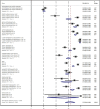The Lombardy region of Italy has been hit heavily by the coronavirus disease 2019 (COVID-19) pandemic (Anon, 2020a). During the lockdown period, measures were put in place to avoid any unnecessary risk of spreading the infection, whereby non-essential diagnostic procedures were withheld, but essential outpatient clinics and diagnostic procedures were scheduled without any restriction.
We report our experience of patient access to certain outpatient clinics, laboratory tests, and diagnostic examinations (ultrasound, ECG and first cardiology visit, brain computed tomography (CT) and/or magnetic resonance imaging (MRI), and Toxoplasma gondii screening) at San Matteo Polyclinic Hospital in Pavia during the lockdown period from February 24 to April 24, 2020. A comparison was made to the same period of the year 2019.
Comparing 2020 to 2019, the number of ultrasound examinations was 280 vs 1947, ECG and first cardiology visits was 312 vs 1460, brain CT was 59 vs 309, brain MRI was 148 vs 537, and T. gondii screening in pregnant women was 740 vs 1005, respectively. The relative percentage differences in 2020 when compared to 2019 were calculated. Significance was tested by means of the 95% Wilson score intervals; the confidence intervals for the pooled estimate were then computed using the Wald method. Analyses were performed using Stata 14 (StataCorp.). The results are shown in Table 1 .
Table 1.
Proportional decrease in 2020, compared to 2019.
 |
0 is no decrease (2020=2019), 1 is 100% decrease (2020<<2019).
Overall, fear of acquiring COVID-19 disease led to a significant decrease in outpatient clinic access, laboratory tests, and diagnostic examinations. This decrease is likely to have affected the outcomes of oncological diseases and may have caused a delay in the diagnosis of acute cardiovascular disease (Baldi et al., 2020, Anon, 2020b). On the other hand, it is worth noting that the number of pregnant women accessing the hospital to undergo screening for toxoplasmosis did not show a significant decrease, which was shown for all of the other examinations (p < 0.001). This ‘brave’ behaviour of apparently healthy subjects, the pregnant women, highlights the fact that fear of giving birth to a child with a serious illness is greater than fear of COVID-19 disease, even though this screening is not mandatory. Conversely, fear of COVID-19 disease has led to an underestimation of the consequences linked to delayed follow-up of oncological disease (Franki, 2020) or to a delayed diagnosis of acute cardiovascular disease. Although these patients could have had serious illnesses, they did not visit the hospital, unlike pregnant women.
These data highlight the fact that it is crucial not only to organize COVID-19-free areas for safer access to the hospital, but also to provide a strong motivation through appropriate communications (Sing, 2020).
Funding
University of Pavia.
Ethical approval
Approval was not required.
Conflict of interest
No conflict of interest to declare.
References
- World Health Organization; Geneva: 2020. Coronavirus Disease (COVID-2019) Situation Reports.https://www.who.int/emergencies/diseases/novel-coronavirus-2019/situation-reports/ [Google Scholar]
- Baldi E., Sechi G.M., Mare C. Out-of-hospital cardiac arrest during the covid-19 outbreak in Italy. N Engl J Med. 2020;(April) doi: 10.1056/NEJMc2010418. [DOI] [PMC free article] [PubMed] [Google Scholar]
- https://www.emergencyphysicians.org/press-releases/2020/4-28-20-new-poll-nearly-a-third-are-delaying-or-avoiding-medical-care-due-to-covid-19-concerns.
- Franki R. 2020. News Medscape Medical News Cancer Screening, Monitoring Down During Pandemic. May 05. [Google Scholar]
- Sing J. 2020. Medscape Hospital Medicine Commentary Lessons learned during the Covid-19 Pandemic. May16. [Google Scholar]


